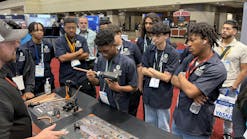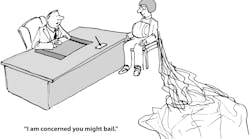Facing one of the most intense competitions for employees in years, contractors are finding they can hang onto valuable employees longer by engaging in 'stay interviews.' Recruiting experts say these interviews ensure current employees feel valued -- while uncovering beneath-the-radar problems that could lead to abrupt departures. Plus, they can spare contractors the often arduous process of onboarding a promising new hire -- if they can find one.
The stay interview is not a new concept, but it is an idea that will benefit many of those hearing about it here for the first time.
Says Len Monfredo, principal, E.M. Duggan: "Some of our best successes have come from the ideas of the people in the trenches. We routinely check in with employees and encourage them to share their experiences and ideas."
Knowing that a staff will often face challenges or be in the middle of individual situations, Ronald C. Kerins, Jr., president, Greyhawk, says the construction consultant company will frequently cut to the chase regarding employee discussions.
"Greyhawk has always advocated for senior managers maintaining regular communication with staff and not wait on the annual review to solicit feedback on [those situations]. We strive to embrace the ‘tough love’ they share and be receptive to adjusting based on feedback. It may help us retain valued employees -- and ultimately, make the business better," Kerins says.
Essentially, stay interviews say, "We care about what you have to say, we value you as a part of our organization, we are assessing workplace culture, workplace communication" and we want to improve for you as an organization and leaders," says Matthew W. Burr, owner, Burr Consulting, specialists in human resource consulting.
Richard Finnegan, an HR consultant who literally wrote the book on the topic -- "The Power of Stay Interviews for Engagement and Retention," says, "Senior managers know that unwanted turnover and disengaged employees drag down profits. Conducting stay interviews is an effective, fast solution that gives a mega-return on investment."
Work Motives Beyond Money
Interestingly, the success of stay interviews also dispels the common notion that money -- and the pursuit of more of it -- is the overwhelming reason why employees disappear from the workplace.
It's much better for contractors to develop the fine art of conducting stay interviews than become the master of the exit interview.
Says Beverly Kaye, co-author "Hello Stay Interviews, Goodbye Talent Loss": "Most employees who leave don't "start looking for other opportunities because of dissatisfaction with pay, perks or benefits." Instead, Kaye says employees are more likely to bolt if one of these key 'reasons to stay' are lacking:
- meaningful, challenging work
- a chance to learn and grow
- a good boss
- the sense of being a part of a team.
In a phrase, It's much better for contractors to develop the fine art of conducting stay interviews -- than become the master of The Exit Interview.
Jon Kinning, chief operating officer and executive vice president, RK Industries, is a big fan of pulse surveys. In addition to stay interviews, "We launch employee engagement surveys to understand all parts of our organization and its impact on employee engagement and fulfillment," Kinning shares.
Lisa Murphy, HR manager, MTech Mechanical, sees similar value in engagement surveys. "If you are invested in keeping your employees – try and dig in on what may cause them to leave and determine if that is something you can improve or counteract. We have done Top Workplace surveys on a yearly basis -- as well as smaller focus groups with team members -- to find out what we as an organization should stop, start or continue doing. The feedback is incredibly valuable when you dive in," Murphy says.
Use Standardized Scripts
Burr recommends standardizing the questions contractors use in their stay interviews. This will enable managers to analyze information and insights on an employee-by-employee basis. Plus, the collation and analysis of data from these standardized interviews -- using either off-the-shelf Stay Interview software or a custom solution -- may enable you to develop business-wide policies based on concerns widely shared by your employees, he says.
Make sure the employee's manager -- and not HR -- is the primary interviewer: Given that an employee generally has a day-to-day relationship with a manager -- rather than HR -- it's critical that the manager conduct the Stay Interview, according to Christopher Mulligan, CEO, TalentKeepers.
Be ready to be the listener -- and hear some things you'd rather not hear: Says Aaron Schuh, president, Recruit4Business: "The employee should talk the majority of the Stay Interview, as the interviewer listens and takes notes on key points and concerns.
"Leave your ego at home and be ready to listen for ways you can improve your business and the loyalty of your employees."
Chat Frequency Matters
Experiment with the frequency of your stay interviews: Recruiting experts and contractors vary widely on how often Stay Interviews should be conducted.
Wendy D. Glauber, vice president, human resources and general counsel for mechanical contracting firm John W. Danforth, sees great benefit in a series of interviews for new employees.
"We do formal check-ins with new hires at their 30-day, six-month and one-year milestones to help ensure their integration as part of the Danforth team is as seamless as possible, and that they have a comfort level with the company."
Adds RK Industries' Kinning: "Frequent reviews -- either quarterly or bi-annually -- keep employees engaged, feeling heard -- and that their work/effort is being recognized."
Mulligan suggests at least once-a-quarter -- with the first interview scheduled within 14 days of the hire.
Michael Murphy, CEO of Platinum Group, a full-service payroll, human capital management and accounting firm based in Asheville, NC, prefers to stay flexible. "Frequent -- possibly quarterly -- check-ins can keep things relevant, addressing what might be top-of-mind for employees."
Murphy -- the 2021 Asheville Area Chamber of Commerce Small Business Leader of the Year -- explains that the exact frequency will depend on the current climate of the company:
- Are there big shifts in direction that might affect people’s well-being?
- Or, are there external forces at play that require pivots -- where utilizing each employee’s skills to the maximum are essential?
Author Beverly Kaye thinks as often as once-a-month could work.
Adds Peacock: "The most important thing is for the employee to know you will listen on a regular basis."
Stay interviews demand trust, so be sure employees are convinced they won't be penalized for what they say.
Telegraph clearly that the stay interview will be a safe space for the employee: The very premise of the stay interview -- 'Tell me what's on your mind -- good and bad' -- demands real trust from an employee. So, you'll want to be sure employees are convinced they won't be penalized for what they say.
Says Mulligan: "Executed properly, stay interviews provide a safe, structured discussion for team members to share their career growth aspirations, how they prefer to lead, engaged and recognized."
*Be prepared to dig deep: The more granular you're able to get with your Stay Interview, the more likely you'll be able to effect real, productive change.
Jim Peacock, owner and principal at Peak Careers Consulting, for example, discovered -- with a little digging -- that one of his employees wassecretly pinning for some imaging software that would enable her work to appear more artistic and professional.
"This was a minor thing for me and a convenience thing for her. I would never have known if I had not asked her," he says.
Be Ready for Tough Questions
While many managers are reluctant to do stay interviews for fear they'll be unable to deliver on some employee requests, Kaye recommends managers be honest about what they're actually able to do -- and then focus on those capabilities.
"Our research has proved that if managers are willing to hang in and drill deeper," they'll be able to find three or four changes for an employee that they're able to make, Kaye says.
Follow Through
Probably the easiest way to sabotage your stay interviews is to nod and smile -- and then do nothing. Most employees realize that asking for the moon will get them nowhere. But they'll also be thoroughly disenchanted with you if you ask them to share openly about their concerns -- and then ignore them. Says Platinum Group's Murphy: "Letting them know they are heard by the actions you take after the interview is the most powerful thing you can do."
Adds Burr: "If the organization fails to act, employees will never trust the process again."
Joe Dysart is an Internet speaker and business consultant based in Manhattan. He can be reached by phone at (631) 328-6069.












